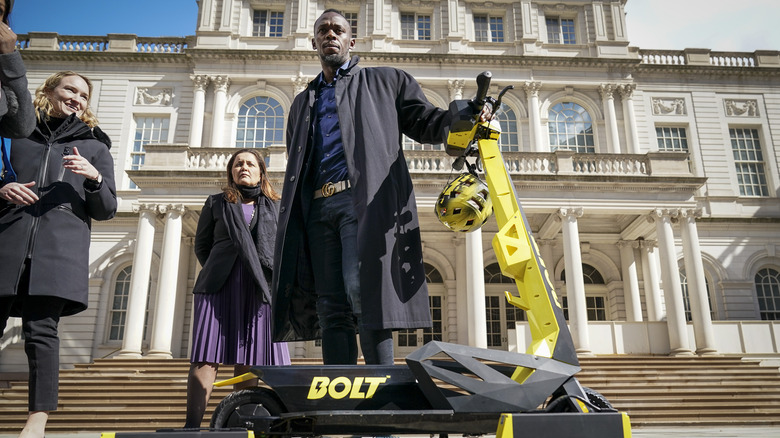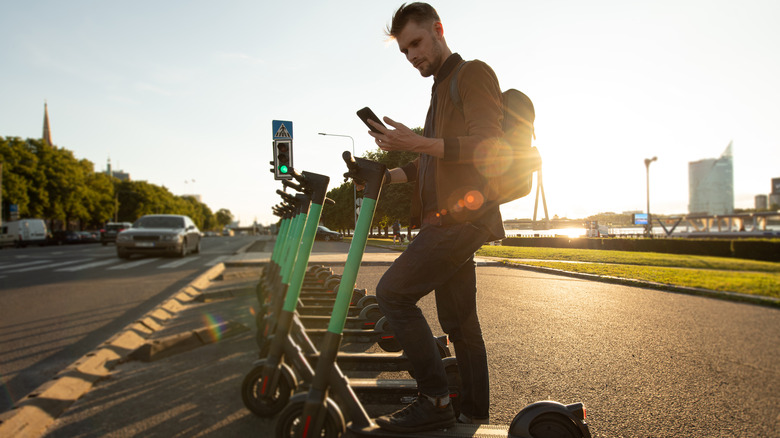Usain Bolt's Scooter Company Has Seemingly Imploded
Citizens and the officials of several cities — as well as the internet at large — have been left asking "What happened?" after Usain Bolt's scooter company seemingly vanished without a word. The sudden departure left a lot of equipment in its wake, including scooters and bikes, all of which were being actively used until recently. The logical first step in such a situation is to reach out to Bolt Mobility directly, but this time, it's not quite that easy — all contact attempts have been unsuccessful.
The official website for Bolt Mobility is still up, letting potential customers believe that everything is fine, even though it doesn't seem to be. The start-up co-founded by iconic Olympic gold medalist Usain Bolt is not to be confused with the Estonia-based Bolt many Europeans are familiar with. While the latter is a service closer to Uber, with rides, scooters, and food delivery, Bolt Mobility provides (or should we say, provided) rental electric scooters and e-bikes. Using the Bolt Mobility app, customers were able to rent one of the company's light electric vehicles and then park them when they were done, leaving them for the next users to pick up.
While companies crumble and fall nearly all the time, especially with the current state of the world economy, it's bizarre for any service to seemingly disappear overnight — even more so when it's co-owned by a world-class Olympic sports figure. What exactly happened to Bolt Mobility?
Even the CEO of Bolt Mobility is unreachable
First observed by the citizens of affected cities, the company's strange downfall was first reported on by TechCrunch. The publication notes that Bolt Mobility has stopped operating in Portland, Oregon, Richmond, California, and Burlington, South Burlington, and Winooski in Vermont. It left behind hundreds of pieces of equipment that now lie abandoned and cannot be used due to lack of battery charge. The heaps of equipment naturally drew the attention of city officials, but unfortunately, not even they were able to reach anyone related to the company. This includes the CEO Ignacio Tzoumas.
TechCrunch itself tried to get in touch with Bolt in order to obtain a statement, all to no avail, and the list of attempted contacts is fairly long, including the company's communications department, employees, investors, and the customer service hotline. Bolt Mobility used to have a PR agency, but the firm no longer seems to represent Usain Bolt's start-up. Bryan Davis, the senior transportation planner in Chittenden County, Vermont, told TechCrunch that Bolt informed the department that it will be ceasing operations as of July 1. Bolt failed to make this known until a week later. However, to this day the equipment remains in the cities, with no one there to pick it up.
The affected cities are now setting dates for Bolt to collect the bikes before they will do it themselves in order to repurpose them. Strangely enough, Bolt seemingly continues to operate in some areas, but the downfall also progresses. TechCrunch issued an update stating that Bolt Mobility is now offline in the city of Richmond, the county of Montgomery in Virginia, and St. Augustine, Florida.
Bolt Mobility didn't act, but another company did
Although weeks have passed since Bolt Mobility's strange disappearance, the company still remains silent on the matter. The official website hasn't been updated, and the social media channels have been quiet since June 2022. In the wake of this bizarre situation, many e-bikes have been left behind, and the cities that house them were left helpless with tons of electric waste that didn't belong to them. The bikes and scooters remain locked until they are paid for with the Bolt Mobility app, so no one can use them or repurpose them. Fortunately, as Electrek reports, the streets may be cleaned up soon enough.
It appears that the company that produced the Bolt Mobility vehicles, Element LEV, didn't want to see so many e-bikes, scooters, and mopeds to go to waste. Many people used them for their daily commute, but now, they are left completely useless. Element LEV decided to contact the affected cities directly and attempt to unlock the vehicles so that they can be used again by the cities themselves or another company. This is not an easy process — the company doesn't have a direct contract with any of the cities the way Bolt Mobility did, so there are a lot of hoops to jump through.
The company will begin by securing and collecting the bikes, which are now scattered all around the cities that Bolt Mobility vanished from. Then, once that's done, it will try to unlock the bikes and allow the cities to use them yet again. As for what's happening with Bolt Mobility, we wish we had answers, but we're as confused as everyone else as we echo the question: "What's going on?" It might be time for an official press release, Bolt.


